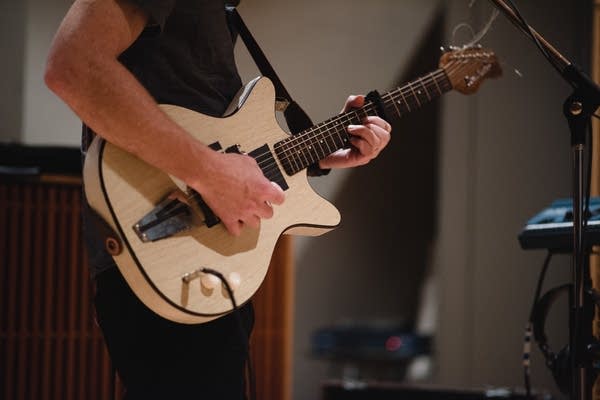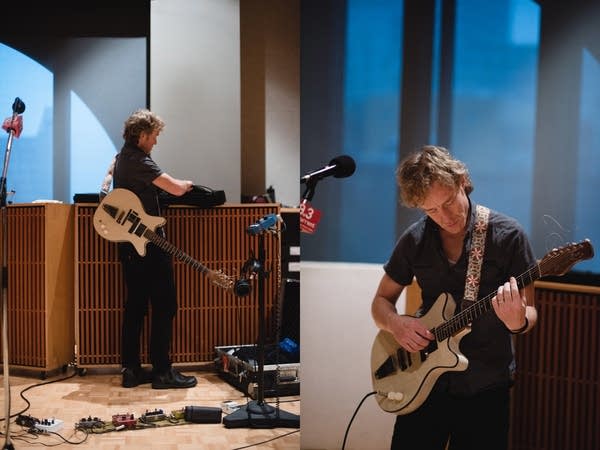The Current's Guitar Collection: Low's Alan Sparhawk, Danelectro Convertible
by Luke Taylor
September 23, 2015

Alan Sparhawk of Low describes his Danelectro Convertible as "weird," but that's what he likes about it. "Sometimes guitars speak back to you, and they give back to you, and that's just magic," he says.
After an in-studio session at The Current, Alan had this to say about the guitar he's taking on tour for Ones and Sixes:
What type of guitar were you playing in the session today?
It's this 1960s Danelectro Convertible. It's the hollow-body one, it's got a sound hole in the middle. It's got the lipstick pickup — anybody familiar with the Danelectro brand will recognize it as the weird hollow-body electric. I have a couple of them.
And this one is really weird. It has a neck from a different guitar; the Danelectro factory used to make guitars for several different companies — just whoever was marketing them, for different regions, even. The neck on it is from a different model that they made. I've read stories about how they apparently used to do that. Like if they ran out of parts one day, they'd just go, "Oh, well, go grab a few of those and put that on there." Some of the stuff was pretty interchangeable, so it's not surprising.
You mentioned it has the lipstick pickup.
Yeah, it's kind of thin and clanky. The body is Masonite and hollow, so it's not as rigid as you'd like necessarily an instrument. If you want something to resonate, Masonite's not the best material. It's kind of dead. It's like playing a Kleenex box with rubber bands on it! (laughs)
Over the years, I've gone through a bunch of different guitars. I'll go through phases of three or four years where I'll be kind of into a certain guitar and I'll play that all the time, and kind of get used to it. It's fun doing different kinds. Sometimes you just need to shift and challenge yourself with something that's different and forces you to play differently.
Has this one been your go-to for a while?
Yeah, for a couple of records now. I used it a lot on Invisible Way and a lot on this new record, Ones and Sixes. That's as long as I've had the guitar.
Do you remember where you got this one?
I'm pretty sure I got this one at Music-Go-Round in Duluth. It's just a used music store up there. It came in and the guy there knew I had another Danelectro, so when this came in, he said, "Hey, check that out," because it's not something you see very often. And it's sort of a weird guitar. Not a lot of people are really looking for them.
When you first saw it, were you able to tell it was made from different parts?
I didn't recognize the neck; it definitely had a different neck on it. I thought, "Well, that's weird." I thought maybe someone had made a new neck for it — a previous owner or someone. I just noticed it was different, and then when I went to play it, for some reason — every neck is slightly different, especially different models and stuff — I just noticed it played a little bit differently from the one I had before.
It's a little bit of a wider fretboard. It just kind of fit; I have really stubby, square-ended fingers, and it's kind of nice to have a little bit more room. I had been playing a Les Paul for a while, which has more of a wide feel, too. So it was an easy adjustment, neck-wise, but a very, very different animal with the pickup. It's just a different thing. There are different places where it responds.
When you tried it out at Music-Go-Round, was there something that jumped out at you tonally? Did you try it with an amp?
No. Just knowing the lipstick pickups, I figured … I plugged it in and played it and I thought, "Oh, this works for sure." The pickup wasn't the magic. It was the neck. I was like, "Wow, this plays really interesting." It seemed really fluid and just really natural, it just fit my hand.
Whenever you get guitars, you'll pick up one — it could be a really expensive, really amazing, beautifully made guitar — but if it doesn't fit, it doesn't vibe with your hand, there's not a lot you can do. Sometimes just the most unexpected guitars do that. I think a lot of the guitars I've played over the years, it's always an unexpected one, even Les Pauls. I'd played Telecaster for years, and I thought I could never figure out Gibsons; they just didn't feel right. Then someone had me play this Les Paul that had been worn in and it just had the right feel or something, and then suddenly it was like, "Oh, OK, I see what the Les Paul is about now." And then that was sort of the door into understanding and of course, certain ones are amazing and certain ones are not as amazing.
If a guitar speaks to you — sometimes you pick one up and it just immediately feels musical, and if it inspires you … If you've been playing guitars and trying them out in the stores for years and years and years, you start getting a sense for that. If you work in a guitar store for a few years, you get pretty desensitized to the guitars and stuff, but you get very sensitized to, "Oh, that one, that weird one over there, that one actually plays really great." You start seeing that.
I like that. I like when I'm surprised when a guitar demands, "You play me, because there's something in here and you're going to have to work hard to make this work." You can always sense it when you pick it up — there's something there. Even if it's not there right away, you know, there's something there and you can dig into it and find it.
I think everybody who loves guitars sort of recognizes that. Sometimes guitars speak back to you, and they give back to you, and that's just magic.
When you're writing, do you tend to write on the Danelectro, or do you have an acoustic guitar that you use?
I write on electrics. I've never been much of an acoustic guy. I have a few and they're fun, and every once in a while I'll use them on records. Sometimes more, sometimes less. But electric guitars — there's something about the electric and the electricity and the interaction with the amp that is part of the way I want to hear what I want to hear musically. It's more than just the notes and stuff on it; sometimes it's the sound of that electrical circuit that sometimes is part of what makes the song.
Part of the Low sound is the use of effects.
I really like the ZVEX stuff; I have the Octane 3 is probably my favorite fuzz pedal. It is just really aggressive and it really interacts well with tube amps. It's sort of that sound that you want, like, "I wish I could step on this pedal and it sounds like a volcano exploding," or just that really over-the-top but just sort of even just-beyond-your-control kind of chaos. Especially live for some reason, it just works well with amps.
Another is the ZVEX Super Hard On, which is just a line boost. I like to ride the amp, I like to use the amp for the sound. You can kind of find that edge where it's going from clean to overdrive and sort of playing that edge can be really musical. It's another musical possibility. You can kind of roll on the fly. So yeah, just a good pedal that just increases the signal without coloring it. It is really pretty useful.
I have an old SIB Echo pedal that I like a lot. I wish they would keep making them. I don't think that company is still making them, but they're really great. They're really musical, a really organic delay.
And the looper, the ZVEX Loop Junkie. I use that a lot; it's really nice for textures.
And will the Danelectro be the guitar that people will see when you're on tour?
Yeah. That's the one I'm bringing on tour. I have this other Telecaster I'm trying to figure out if I can get used to it. I brought that along just as a spare because it's not as loud when you're sitting in the hotel and trying to play something.
The Danelectro is partly acoustic, so if you're sitting in the quiet and you'd like to play or practice a little bit in a hotel room, it just sounds like somebody playing a banjo in the room, so it's not so fun when your wife is trying to watch TV.

